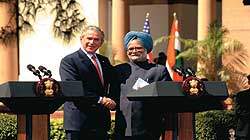 With the India-US nuclear deal facing an uncertain future, there has been a spate of analyses on the domestic opposition to the deal from within India. Security hawks and sections of the Bharatiya Janata Party worry that the deal may constrain India’s strategic options in the future. And for India’s Left the most disturbing implication of the deal is that it will bind India more closely to the US. But where does the Indian public stand? What do Indians think about issues with foreign policy implications—and in particular about the US? With the India-US nuclear deal facing an uncertain future, there has been a spate of analyses on the domestic opposition to the deal from within India. Security hawks and sections of the Bharatiya Janata Party worry that the deal may constrain India’s strategic options in the future. And for India’s Left the most disturbing implication of the deal is that it will bind India more closely to the US. But where does the Indian public stand? What do Indians think about issues with foreign policy implications—and in particular about the US?
Cross-national surveys conducted by the Pew Global Attitudes Project and the Chicago Council on Global Affairs clearly show that the Indian people have favourable feelings towards the US. In both surveys on global public opinion, India consistently ranked near the top of the list in its confidence in and support of the US. This has not always been the case, however. In 2002, the percentage of the polled Indian population expressing a favourable opinion of the US, at 54 percent, was in the lower half of the countries polled. In 2005, the percentage shot up to 71 per cent, the highest of any country polled. And in the survey conducted earlier in 2007, India ranked 14th among the 47 nations, with 59 per cent of the public holding favourable views of the US.
However, the aforementioned cross-national surveys suffer from two problems. First, since their sample frame is mainly urban, they can potentially be seriously biased. Second, the sample sizes are too small (less than 3000 in both cases) to understand variation within India.
To address this problem we conducted the largest ever random, nationally representative survey of foreign policy attitudes of Indians in 2005-06 covering 212,563 households. Our survey design allowed us to measure the response of nine (six in urban and three in rural India) specific socio-economic (SEC) groups, defined by education and occupation. What does the Indian data tell us?
To the extent that Indians express their opinion about the degree of warmth (or positive feelings) towards a country (the choices were US, Japan, China, Pakistan, Bangladesh and Saudi Arabia) the data is unequivocal: while the US does not rank above the other countries in all categories (Figure 1), no matter which way the data is segmented—by socio-economic group, income, state, gender, age, rural-urban—Indians have the warmest feelings towards the US followed by Japan, with (expectedly) Pakistan at the other end of the spectrum (Figure 2).
Higher socio-economic groups in India also have warmer feelings towards the US (Figure 1). More interestingly, however, the weaker socio-economic groups also unambiguously prefer the US relative to other countries.
The warmer sentiments towards the US are valid in every state. Even in states ruled by the Left parties who are the most vociferous opponents of closer relations with the US (Kerala and West Bengal), respondents clearly prefer the relationship with US over the relationship with China (Figure 3).
The evidence from other questions in the survey indicates the Indian public is not naive and indeed demonstrates a streak of hard realism in its judgments about the US. The majority of respondents felt that the Indian government should be tougher in its negotiations with United States. Indeed as events transpired after the survey was conducted, the Indian government did precisely that, and the resulting deal was considerably more favorable than the initial negotiations.
There is no empirical evidence that Indian public opinion opposes closer ties with the US. Indians see the US as worthy of emulation but are wary of US power—sensible people anywhere ought to be bothered by the accumulation of power no matter who has it.
Having pushed so hard for the deal, both within India and in its external negotiations, the government’s balking now has several sobering implications. Its isolation in nuclear technologies will continue. Major powers will be much more wary in taking risks in reaching out to India. And India’s relations with its US diaspora will suffer—who will bat for India if the government has so little credibility? If India fumbles in how it handles this deal, it will be a refection of just how much India’s attempts to become a major power will be hobbled less by its external environment than its domestic constraints, in particular the fragmentation in India’s polity.
|